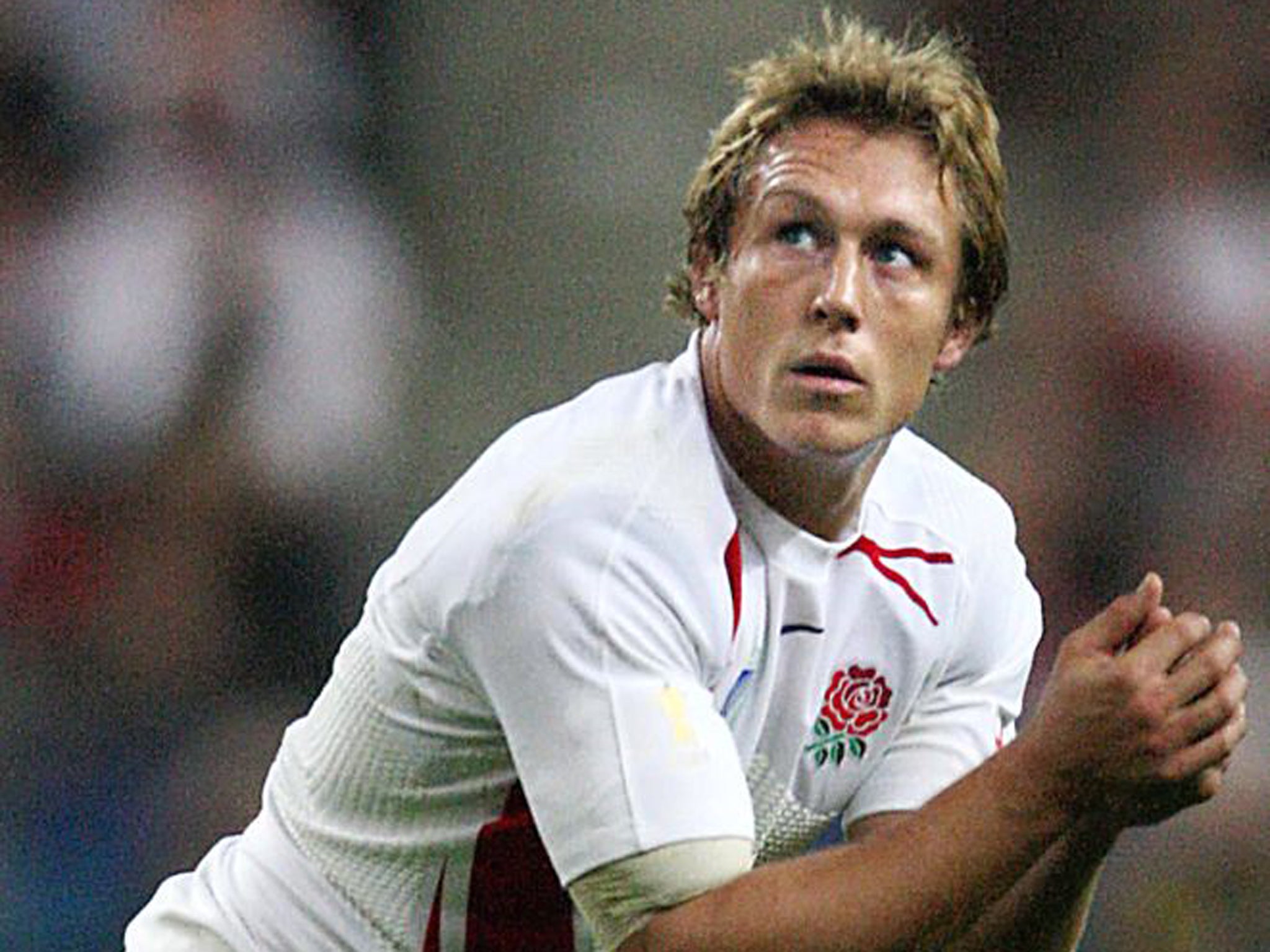Jonny Wilkinson retires: Jonny Wilkinson, an icon of the modern game, calls it a day
World Cup hero who set new levels of professionalism to retire at end of Toulon’s season

Stuart Lancaster knows a perfectionist when he sees one – fully paid-up members of the “no stone left unturned” club instinctively recognise a kindred spirit – so it came as no surprise yesterday to hear the England coach waxing lyrical on the subject of Jonny Wilkinson. Lancaster reacted to confirmation of the saintly outside-half’s imminent retirement by lauding him as a transformative figure. “Jonny changed the way people prepared to play the game,” he said.
It was an interesting choice of words. At no point did Lancaster take issue with Wilkinson’s achievements on the playing field as opposed to the training field – he paid homage to the World Cup-winning midfielder’s goal-kicking mastery, the unprecedented ferocity of his defensive work, the breadth of his skill-set – but the coach’s focus was on other aspects of his modus operandi: the application, the dedication, the professionalism.
“In that respect, his impact has been phenomenal – I can’t think of another individual in rugby who has had the same kind of effect,” Lancaster remarked before hinting that, at some point in the indeterminate future, Wilkinson might be offered a mentoring role in the red-rose set-up. “He deserves all the plaudits he gets. I can’t count the times I’ve heard a player say: ‘I thought I was professional, I thought I worked hard… but he took it to a different level.’”
Wilkinson, who leads Toulon in Saturday’s Heineken Cup final against Saracens at the Millennium Stadium and will call it quits after the French Championship decider with Castres at the end of the month, turns 35 on Sunday, some 16 years after making his England debut. He retired from international rugby following the shambolic 2011 World Cup tournament in New Zealand – to his credit, he was among a tiny handful of players who were prepared to condemn the behavioural excesses that undermined the campaign, albeit in characteristically guarded fashion – and ended that part of his career with some remarkable figures: 1,246 points from 97 Test appearances, including the half-dozen he made for the British & Irish Lions.
The Wilkinson package – he was one of rugby’s most wholesome, honest-to-goodness heroes, as well as a rewriter of the record books; a player whose stoical acceptance of long-term injury setbacks enhanced his reputation as a model professional still further – was tailor-made for this modern rugby era, and it gave him a status and a renown that resonated way beyond the narrow confines of the union game. He became, without doubt, the most celebrated rugby player in history.
Which is a very different thing to being the finest of all outside-halves. Was he a better No 10 than Daniel Carter of New Zealand? Hand on heart, it is difficult to say so. Was he on a level with Mark Ella or Michael Lynagh of Australia; with Barry John or Phil Bennett or Jonathan Davies of Wales? Rugby was a different game when those maestros were at work, but on balance the comparison does Wilkinson no favours. Those few who had the nerve to question the Englishman’s creative gifts – who saw him as a technician rather than an artist – have been shouted down by the multitude since the moment he dropped the goal that clinched the Webb Ellis Trophy in 2003, but they will be proved right over time.
For all that, Lancaster would happily include him in his squad for the forthcoming three-Test series in All Black country. Yesterday, the coach added 21 names to the 20 already in camp, and he will call on more once this weekend’s European finals are safely out of the way. Yet there are a number of positions, outside-half included, that continue to give him pause for thought. He will not feel completely comfortable with his lot until the contingents from Saracens and Northampton, who square off in the Premiership final at Twickenham a week on Saturday, land in New Zealand and declare themselves fit and available for the second meeting with the world champions in Dunedin on 14 June.
Lancaster was optimistic that two important players, the Harlequins full-back Mike Brown and the Gloucester centre Billy Twelvetrees, would recover from injury in good time to play significant roles on tour, although he was less cheery on the subject of Dylan Hartley, the Northampton hooker. Hartley’s shoulder issues continue to give cause for concern, hence the attempt to fast-track the recovery of the Bath front-rower Rob Webber, who is suffering with ankle problems.
One additional hassle Lancaster could have done without concerned Chris Ashton, who is hardly a complete stranger to disciplinary trouble. The Saracens wing was ticked off by the Rugby Football Union yesterday following his brazen attempt to distract the Harlequins goal-kicker Nick Evans during last weekend’s Premiership semi-final. What would Wilkinson have made of such a stunt? We know the answer to that one.
England training squad: New players added
A Allen (Leicester), M Brown (Harlequins), R Buchanan (Harlequins), D Care (Harlequins), W Collier (Harlequins), J Gaskell (Sale), J Gibson (Leicester), J Gray (Harlequins), R Harrison (Sale), G Kitchener (Leicester), J Marler (Harlequins), C Matthews (Harlequins), G Parling (Leicester),
C Robshaw (Harlequins),
E Slater (Leicester), K Sinckler (Harlequins), M Tuilagi (Leicester), L Wallace (Harlequins),
D Ward (Harlequins), R Webber (Bath), B Youngs (Leicester)
Subscribe to Independent Premium to bookmark this article
Want to bookmark your favourite articles and stories to read or reference later? Start your Independent Premium subscription today.

Join our commenting forum
Join thought-provoking conversations, follow other Independent readers and see their replies
Comments